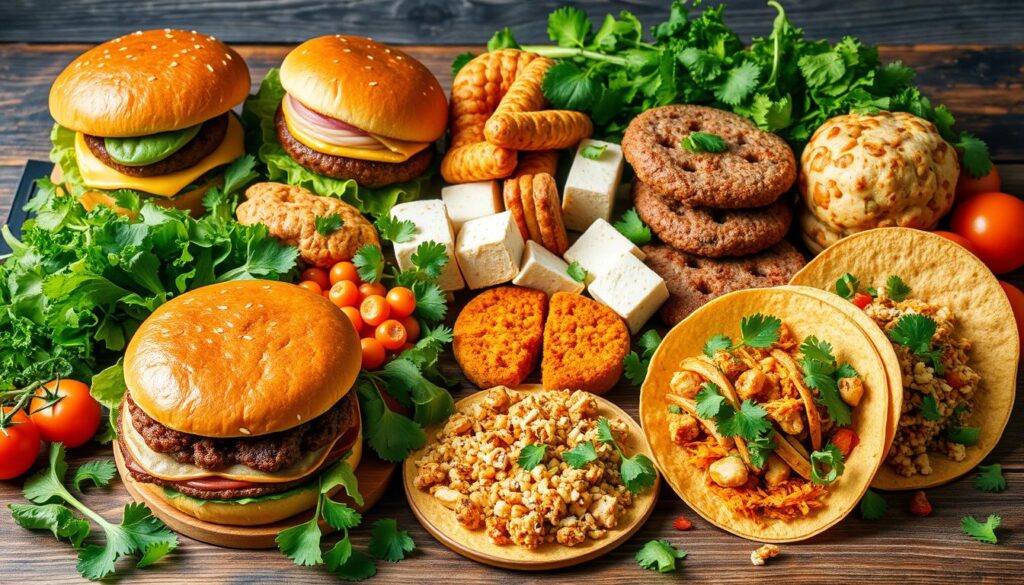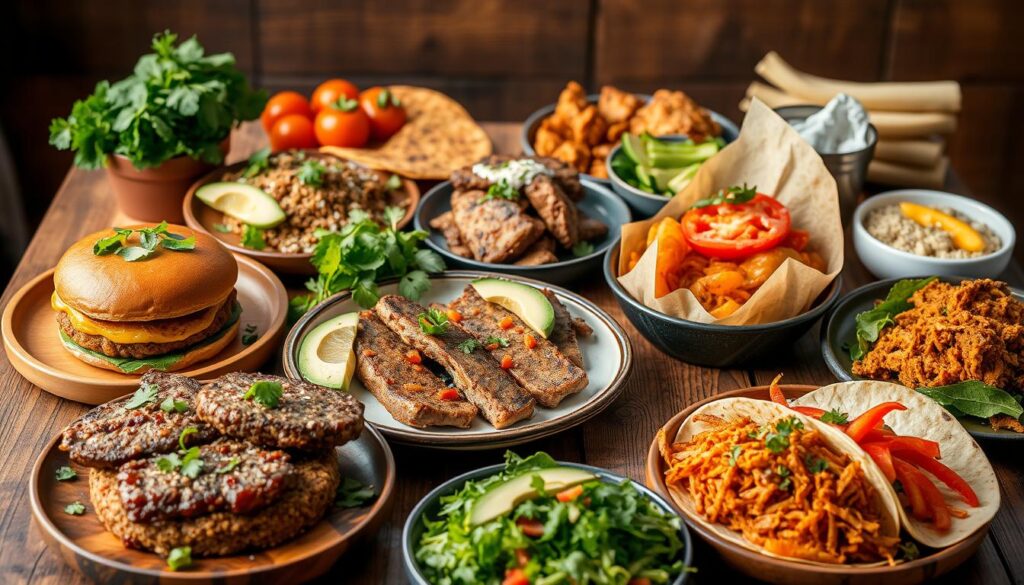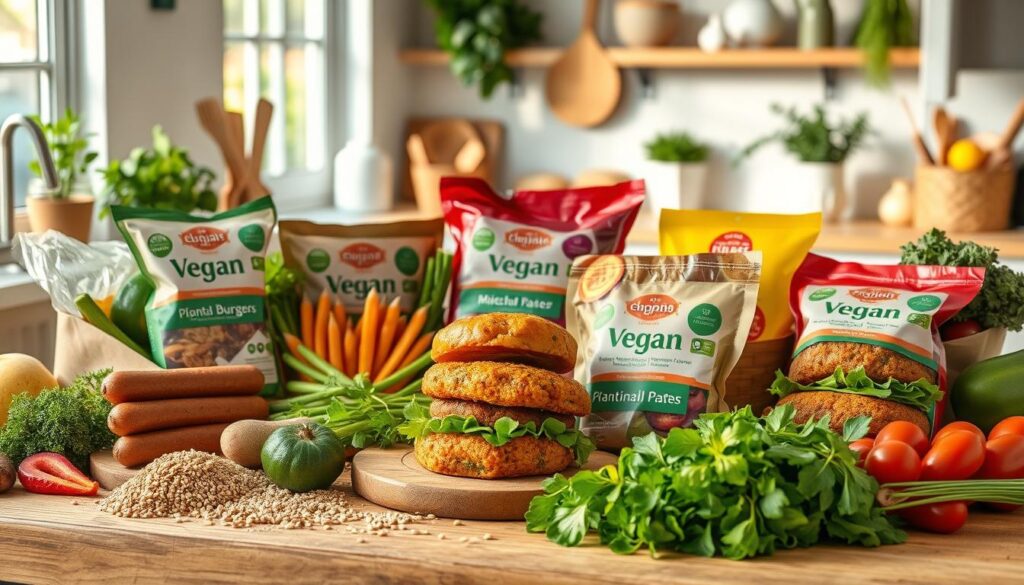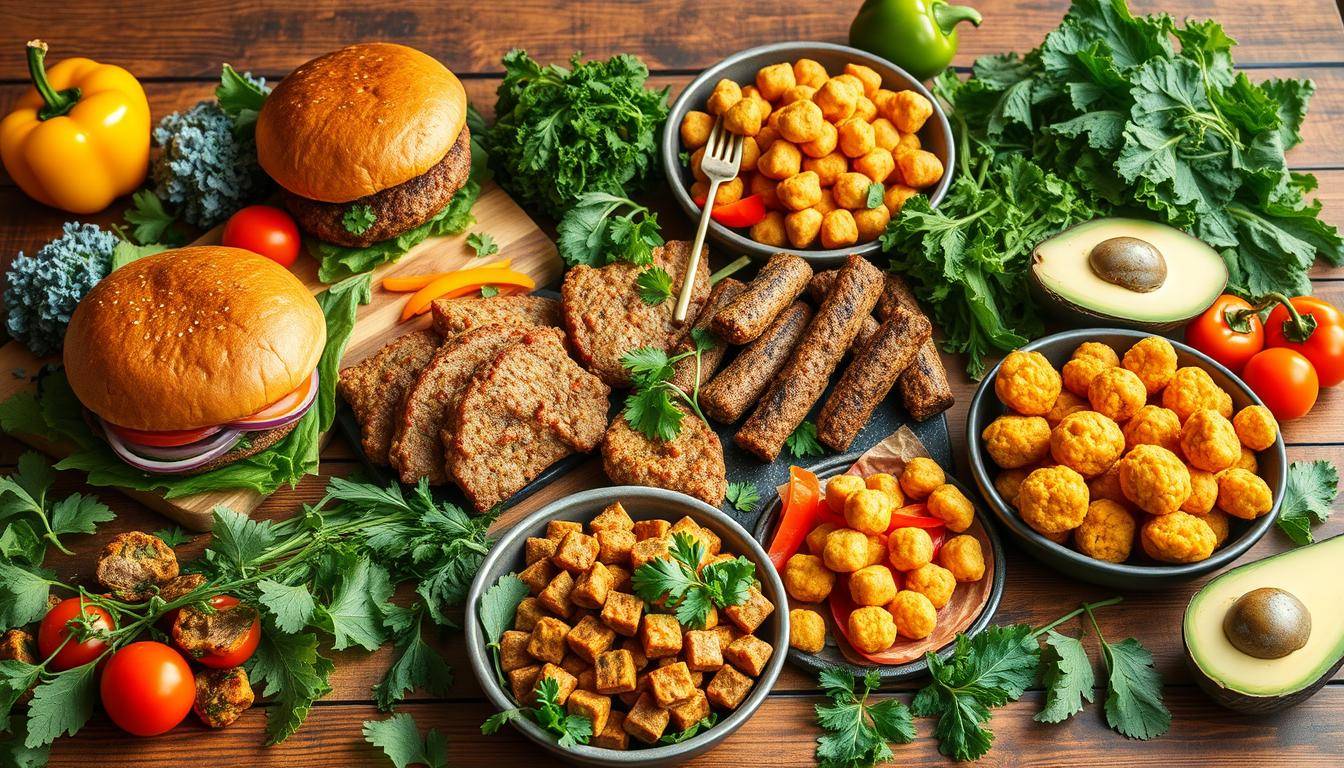Have you ever thought about whether Vegan Alternatives to Meat are as good as the real thing? With more people caring about the planet and their health, Plant-based meat options are becoming increasingly popular.But do these plant-based foods match up in taste, provide the same nutrition, and benefit the environment as much as meat does?
This guide delves into the many facets of vegan meat alternatives. We will explore their health benefits, flavor profiles, and environmental impact. You’ll get insights into popular options like tofu, tempeh, and other soy-based products.
These alternatives are not only making our diets healthier but are also shifting the food industry towards a more ethical and sustainable future.
Worried about the cost of a vegan diet? We’ve got advice for you. Find out how to eat sustainably and affordably here.
Key Takeaways
- Vegan meat substitutes make up 11% of the market, highlighting their growing popularity.
- They contain more carbohydrates and fiber compared to traditional red meat and poultry.
- A shift to plant-based proteins can reduce the risk of cardiovascular diseases.
- Plant-based meat alternatives are projected to see substantial global sales growth.
- Protein isolates and concentrates, primarily from soy, are the key components of these alternatives.
- Extensive research is ongoing to diversify protein sources for plant-based meat production.
Introduction to Vegan Meat Alternatives
More people are choosing vegan meat alternatives due to their environmental and health benefits. This choice is driven by concerns about the environment, health, and animal welfare. Traditional meat production has a big impact on our planet.
Animal farming is a big source of greenhouse gases, producing 20% of global emissions. Plant-based foods can provide most of our protein on less land than meat. They also use much less water, up to 99% less than beef.
As the world’s demand for meat grows, these alternatives offer a solution. They are a sustainable choice for our future.
Adding vegan protein sources to our meals is good for the planet. It also makes our diets more interesting with options like tofu and tempeh. Companies like Beyond Meat and Impossible Foods are leading the way, making these alternatives taste and feel like real meat.
But, it’s important to know what’s in these products. Soy and wheat proteins are common, but pea and potato are being explored too. This variety helps address supply and price issues.
Here’s a table to help you understand the different vegan meat alternatives and their benefits:
| Type | Primary Ingredients | Environmental Benefits | Popular Brands | Nutritional Highlights |
|---|---|---|---|---|
| Tofu | Soybeans | Low land and water use | Nasoya, House Foods | Rich in calcium, iron, protein |
| Tempeh | Fermented soybeans | Enhanced nutrient absorption | Lightlife, Tofurky | High in protein, probiotics |
| Seitan | Wheat gluten | Minimal water use | Upton’s Naturals, Sweet Earth | High in protein, low in fat |
| Plant-Based Burgers | Pea protein, potato starch | Significantly less emissions | Beyond Meat, Impossible Foods | Rich in protein, fiber, minerals |
The interest in vegan protein sources is growing. This means more variety and innovation in the market. Vegan meat alternatives are becoming a practical and appealing choice for many.
Why Consider Vegan Alternatives?
In today’s world, eating mindfully is more important than ever. Many are turning to vegan alternatives. This choice is not just about taste and nutrition. It also brings health benefits and helps the environment.
Health Benefits
Choosing vegan options can be very good for you. Plant-based foods often have fewer calories and less fat. They also have more fiber than meat.
A study showed that vegan ground beef has fewer calories and less fat. It also has more fiber than lean beef. While beef has more protein and B vitamins, vegan options are still good for you. They can help lower the risk of heart disease and diabetes.
Environmental Impact
Vegan alternatives are also better for the planet. Meat production uses a lot of resources and pollutes the air. Vegan foods, on the other hand, need less land, water, and energy.
A 2022 survey found that 10% of Americans are vegan. But 73% think veganism is ethical, and 70% see it as good for the environment. As more people learn about these benefits, the food industry will keep improving its sustainable options.
The Taste Test: Comparing Vegan Meat Alternatives
When we compare vegan meats, Impossible Foods and Beyond Meat stand out. People love their plant-based taste, which closely mimics real meat. Each brand offers a unique flavor and texture. Let’s explore how these vegan meats compare to traditional meat.
“True food enthusiasts can tell you that flavor and texture make all the difference. Thankfully, the innovations in vegan meats bring us closer than ever to traditional meat experiences.”
In our taste test, we carefully analyzed the flavors and textures of these vegan options. For example, MorningStar Farms YVeggie Chik’n Strips have 140 calories per serving. Roasted Chicken Strips have 162 calories. Both are tasty and lower in calories than you might expect.
| Product | Calories per Serving | Notes |
|---|---|---|
| MorningStar Farms Incogmeato Breakfast Sausage | 100 | Slightly milder flavor |
| Jimmy Dean Fully Cooked Pork Sausage | 180 | Rich, savory taste |
| Beyond Burger Plant-Based Patties | 230 | Juicy, meaty texture |
| 85% Lean Ground Beef Patty | 283 | Authentic beef flavor |
| Impossible Chicken Nuggets | 240 | Crispy, similar to traditional nuggets |
| Tyson Fully Cooked Chicken Nuggets | 270 | Crispy, kid-friendly |
| Gardein Plant-Based F’sh Filets | 200 | Ocean-like flavor |
| Gorton’s Crispy Battered Fish Fillets | 230 | Classic fish taste |
Vegan alternatives aim to replicate the traditional meat-eating experience. Impossible Foods Burger Patties have 240 calories per serving. A 90% lean ground beef patty has 245 calories. Both are hearty and satisfying.
Popular brands like Beyond Meat and Impossible Foods offer delicious and healthy options. People love their flavors and textures. These vegan meats are not just alternatives but true contenders in the culinary world.
Popular Vegan Meat Alternatives: An Overview
The demand for vegan cooking ingredients has grown, offering a wide range of tasty and healthy options. We’ll explore some top vegan meat alternatives. We’ll look at their origins, how they’re made, how to use them in cooking, and their health benefits.

Tofu
Tofu is made by coagulating soy milk and pressing it into blocks. It’s great for absorbing flavors from spices and sauces. Tofu is packed with protein and calcium, making it a key ingredient in many vegan dishes.
Tempeh
Tempeh comes from Indonesia and is made by fermenting soybeans with a mold. This process gives it a firm texture and a nutty taste. It’s rich in protein and probiotics, making it a nutritious choice for many dishes.
Seitan
Seitan, or wheat gluten, is a favorite for its meat-like texture. It’s made by washing wheat flour dough to remove starch. Seitan is great for dishes that need a chewy texture, like stir-fries and kebabs. It’s also a good source of protein.
Soy-based Products
Soy products include more than just tofu and tempeh. There’s soy milk, soy protein isolates, and textured vegetable protein (TVP). These items are used in many vegan dishes for their nutritional value. They add protein and essential amino acids to meals.
| Product | Origin | Texture | Nutritional Benefits | Common Culinary Uses |
|---|---|---|---|---|
| Tofu | China | Soft to firm | Protein, calcium | Stir-fries, soups, salads |
| Tempeh | Indonesia | Firm, nutty | Protein, probiotics | Grilled, stir-fried, baked |
| Seitan | Japan | Chewy | Protein | Stir-fries, kebabs |
| Soy-based Products | Global | Varies | Protein, amino acids | Drinks, cereals, main dishes |
Nutritional Comparison Between Vegan and Traditional Meats
When we look at vegan vs meat nutrition, it’s key to see how they compare. Traditional meats and vegan alternatives have different nutrients because of their ingredients. Knowing these differences helps us make better food choices.
Traditional meats usually have more protein than vegan options. For example, a beef patty has a lot of protein. But, many vegan burgers have a bit less. Yet, protein isn’t the only thing to think about.
Vegan meat alternatives are great for fiber and complex carbs. These are good for your gut and are found in more plant-based foods. Traditional meats have almost no fiber, making vegan options better in this area.
| Product Type | Total Fat | Saturated Fat | Fiber | Calories |
|---|---|---|---|---|
| Plant-Based Burgers | 30% of total fat | Lower | Higher | Varied |
| Traditional Meat Burgers | Higher | Higher | None | Varied |
| Plant-Based Sausages | Less than 15% | Lower | Higher | Varied |
| Traditional Meat Sausages | Higher | Higher | None | Varied |
The health effects of these diets show the nutrient differences. Traditional meats don’t have heart health benefits over vegan options. But, vegan foods are rich in fiber, which is good for your gut. Vegan foods also have vitamins and minerals like vitamin C and antioxidants.
Finally, the rise in vegan meat demand is due to their low fat and high fiber. This makes them a healthier and more sustainable choice. Knowing these nutritional differences helps us pick the best foods for our health and values.
Vegan Alternatives to Meat: A Comparison of Taste, Nutrition, and Sustainability
Vegan meat alternatives are becoming more popular. People want healthier and eco-friendly food choices. These options have unique benefits, especially in taste, nutrition, and how they affect the planet.

Comparing Taste Profiles
Vegan meat alternatives taste different from traditional meats. They use soy, wheat protein, and legumes to mimic meat. Brands like Beyond Meat and Impossible Foods have made big strides in taste.
Some people might notice small differences, but new products are getting closer to meat taste. What you like to eat is very personal, so everyone’s taste is different.
Nutritional Benefits
Vegan meat alternatives have many health benefits. They are often lower in bad fats and calories but higher in carbs and fiber. This can help with weight and lower disease risk.
They also have fewer bad nutrients than meat. Even though some are ultra-processed, studies show they’re good for health.
Meat can lead to diseases like high blood pressure. Plant-based foods are a better choice for health.
Sustainability Factors
Vegan meat alternatives are better for the planet. Livestock farming is a big cause of greenhouse gas emissions. Plant-based foods use less water and land.
They also help protect biodiversity and reduce chemical use. For those wanting to lessen their environmental impact, vegan options are a good choice.
| Aspect | Traditional Meat | Vegan Meat Alternatives |
|---|---|---|
| Greenhouse Gas Emissions | 65% of agriculture emissions | Significantly lower emissions |
| Water Usage | High | Moderate to Low |
| Land Usage | Extensive | Minimal |
| Nutritional Content | High in protein, fats, and salt | Rich in fiber, lower in fats |
The Future of Vegan Meat Alternatives
The vegan meat industry is changing fast, thanks to new ideas and care for the planet. With food needs set to nearly double by 2050, finding new protein sources is key. New tech in food making is crucial for a green future.
The market for plant-based meats is growing fast, expected to hit over $21.23 billion by 2025. People are choosing these options for their health and the planet. This is driving the creation of cultured meat and other new foods, changing how we eat.
Technological advancements in food production are leading to big changes. Cultured meat, made from animal cells in labs, could cut down on pollution and save land. For example, growing peas and pulses for protein is much better for the environment than raising animals.
Plant-based meats are getting better, tasting and feeling more like the real thing. A plant-based patty has about 19.46 grams of protein, close to beef but with less bad stuff and more good stuff. This shows plant-based diets can be healthier.
The demand for vegan options is growing, including halal and kosher products. The European Commission’s Farm to Fork plan also supports a greener, fairer food system. This trend towards healthier eating is big.
The future of vegan meat looks bright, thanks to growing awareness, market needs, and new tech. These changes will feed more people and protect our planet for the future.
| Indicator | Traditional Meat | Plant-Based Meat Analogues |
|---|---|---|
| Greenhouse Gas Emissions | High | Low |
| Land Use | Extensive | Minimal |
| Protein Content (Per Patty) | 23.33 g | 19.46 g |
| Cholesterol | High | Low |
| Dietary Fiber | Low | High |
Ethical Considerations of Choosing Vegan Meat
The choice to eat vegan meat is more than just a preference. It affects our health, the well-being of animals, and the planet. By choosing vegan, we help ourselves, animals, and the environment.

Animal Welfare
Choosing vegan meat helps animals a lot. Traditional meat production is often cruel. Animals live in bad conditions and are treated poorly.
By picking plant-based options, we help animals. We reduce the need for cruel practices. This shows respect for animal rights.
Human Health
Meat choices also affect our health. Too much meat can lead to heart disease and obesity. Vegan diets are healthier, lowering the risk of these diseases.
Choosing vegan is good for our health. It’s also better for the planet. This choice is smart and caring for our future.
Looking at animal welfare and human health shows why vegan meat is a good choice. It’s a thoughtful decision for animals and our health.
| Aspect | Traditional Meat | Vegan Meat |
|---|---|---|
| Animal Welfare | High Ethical Concerns | Promotes Animal Rights |
| Human Health | Linked to Health Issues | Vegan Lifestyle Benefits |
| Environmental Impact | Higher Greenhouse Gas Emissions | Lower Emissions |
| Resource Use | High (Land, Water) | Moderate |
| Economic Cost | Variable | Can Be High |
Cooking and Preparing Vegan Meat Alternatives
Learning to cook vegan meats is key for tasty and healthy meals. Whether you’re new to vegan cooking or experienced, here are some tips and dishes to try.
- MorningStar Farms Incogmeato Breakfast Sausage Links:
These sausages have only 100 calories per serving, much less than traditional sausages. They have less saturated fat, making them a better choice. Cook them in a pan and serve with whole grain toast or tofu for a great breakfast. - Impossible Foods Chicken Nuggets:
Baking these nuggets makes them crispy and delicious. They have fewer calories than Tyson’s nuggets but more carbs. They’re high in protein, making them a great choice for a meal. - Beyond Meat Beyond Burger Patties:
Grilled, these patties are packed with protein, offering 20g per serving. They have fewer calories and less saturated fat than beef patties. Enjoy them with fresh greens for a healthy meal.
Making vegan dishes is easy with the right tips. Plant-based meats from McDonald’s, Burger King, and KFC show how tasty they can be. For more recipes and techniques, check out our guide on Moroccan Delights.
| Product | Calories | Saturated Fat | Protein | Carbohydrates | Sodium |
|---|---|---|---|---|---|
| Beyond Meat Beyond Burger | 230 | 5g | 20g | 7g | 390mg |
| 85% Lean Ground Beef Patty | 283 | 6.5g | 29g | 2g | 81mg |
| Impossible Foods Burger Patties | 240 | 8g | 19g | 9g | 370mg |
| 90% Lean Ground Beef Patty | 245 | 5g | 29.5g | 3g | 77mg |
Don’t be afraid to try new vegan recipes and explore different flavors. Enjoy the process of creating plant-based dishes and discovering new tastes!
Common Types of Vegan Meat Substitutes
Exploring vegan meat substitutes can be exciting and rewarding. These options are tasty and can replace traditional meats without losing flavor or texture. They also help us make sustainable choices. Let’s look at some popular vegan meat substitutes and what makes them special.
Plant-Based Burgers
Plant-based burgers have improved a lot lately. Brands like Beyond Meat and Impossible Foods are leading the way. They use pea protein, soy protein, and beet juice to mimic beef burgers. This results in a juicy patty that’s healthier and better for the planet.
Plant-Based Sausages
Vegan sausages are a tasty, healthier choice compared to traditional sausages. Tofurky and Field Roast make sausages from plant-based ingredients like seitan and tofu. They taste great, thanks to herbs and spices, and are lower in fat and higher in fiber.
Chicken and Fish Alternatives
Plant-based chicken and fish substitutes are becoming more popular. Gardein and Quorn offer protein-rich alternatives to meat. They use soy protein, wheat protein, and jackfruit to mimic the taste and texture of real meat. Fish substitutes, made from seaweed and legumes, are also a great choice for those looking for omega-3 fatty acids.
| Type | Main Ingredients | Protein Content (per serving) | Brand Examples |
|---|---|---|---|
| Plant-Based Burgers | Pea protein, soy protein, beet juice | 20g | Beyond Meat, Impossible Foods |
| Plant-Based Sausages | Seitan, tofu, legumes | 15g | Tofurky, Field Roast |
| Plant-Based Chicken | Soy protein, wheat protein | 18g | Gardein, Quorn |
| Fish Substitutes | Seaweed, legumes | 12g | Good Catch |
Choosing vegan burgers, sausages, chicken, and fish substitutes is good for our health and the planet. These options are delicious and versatile, perfect for any meal. Whether you’re vegan or just starting, these alternatives are a great choice. Happy cooking!
How to Incorporate Vegan Alternatives into a Balanced Diet
Starting a balanced vegan diet with vegan meat alternatives is rewarding and healthy. It’s important to plan your meals well to get all the nutrients you need. Here’s a simple guide to begin:
For a balanced vegan diet, mix different plant-based proteins. Tofu, tempeh, and beans are great options. Tofu, for instance, has about 11 grams of protein per 4-ounce serving. It also has calcium and vitamin B12.
Tempeh, a fermented soy product, has 17 grams of protein per 83-gram serving. It’s also rich in fiber and vitamins. Legumes, like lentils, are another good choice. A cup of cooked lentils has 18 grams of protein, iron, and fiber.
When planning meals, use a variety of vegan meat substitutes. Seitan, made from wheat gluten, has 20 grams of protein per 3-ounce serving. Mushrooms and jackfruit add protein, texture, and flavor to your dishes.
Here’s a quick comparison of popular vegan meat alternatives:
| Food Item | Protein (per serving) | Additional Nutrients |
|---|---|---|
| Tofu | 11g (4 oz) | Calcium, Vitamin B12 |
| Tempeh | 17g (83g) | Fiber, Vitamins |
| Seitan | 20g (3 oz) | Iron |
| Mushrooms | 5.2g (1 cup) | Fiber |
| Jackfruit | 2.4g (1 cup) | Carbohydrates |
| Beans and Legumes | 18g (1 cup, cooked) | Iron, Fiber |
Always check nutritional labels to choose products that fit your diet. This helps in planning meals that are both healthy and satisfying. With careful planning, a vegan diet can greatly improve your health and well-being.
Conclusion
As we wrap up our guide on vegan meat alternatives, it’s clear that going plant-based is good for us. It lowers the risk of chronic diseases and helps the environment. For example, it cuts down greenhouse gas emissions from farming by 65%.
With meat consumption set to double by 2050, choosing vegan options is key. It helps tackle food insecurity, affecting 258 million people. This shows how important vegan meat substitutes are for our future.
We looked at popular vegan meat options like tofu, tempeh, and soy-based products. They offer great taste, nutrition, and are good for the planet. Plant-based burgers and sausages are now in stores and fast-food places, showing a bright future for vegan meat.
Ethical reasons also support vegan meat substitutes. They improve animal welfare and human health. By choosing these alternatives, we can fight obesity and diseases linked to eating too much energy-dense food.
As you try out different vegan meat products, remember you’re helping the planet and a fair food system. Enjoy the variety and benefits of vegan meat alternatives. Your choices make a big difference in our world.
FAQ
What are some popular vegan alternatives to meat?
How do vegan meat alternatives compare nutritionally to traditional meats?
What are the health benefits of switching to a vegan diet?
How do plant-based meats impact the environment?
Do vegan meat alternatives taste like real meat?
What are the ethical considerations for choosing vegan meat alternatives?
How can I best cook and prepare vegan meat alternatives?
Are there vegan alternatives to other animal products like milk, cheese, and eggs?
What does the future of vegan meat alternatives look like?
How can I start a vegan lifestyle?
https://www.youtube.com/watch?v=YgHeCLEH-sc

